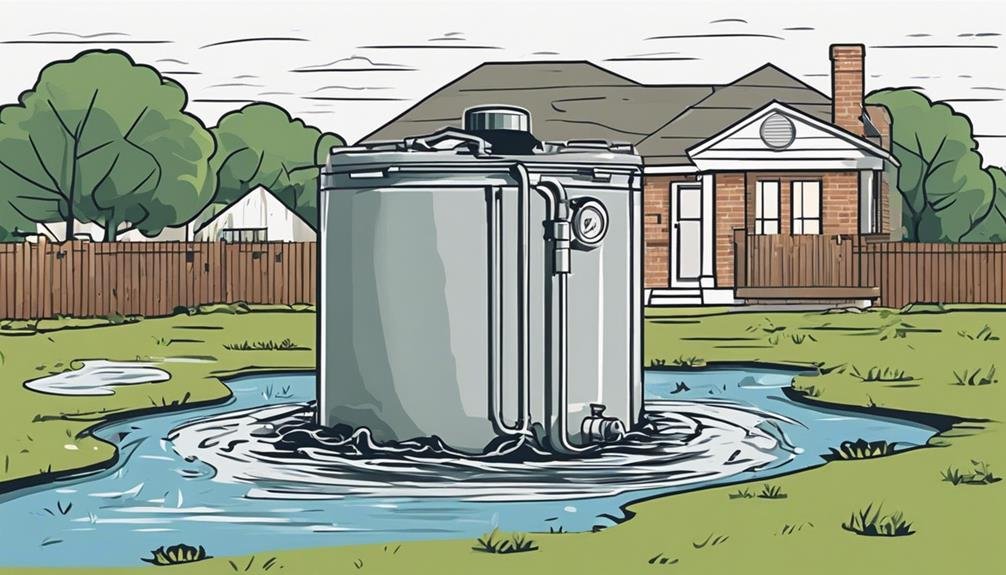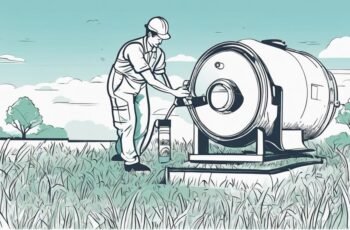Are you aware of the subtle signs hinting at a potential septic system problem lurking beneath your yard? From gurgling drains to soggy patches, your home could be quietly facing a septic disaster.
Understanding the warning signals and taking proactive measures can save you from a messy and costly situation.
Stay tuned to unravel the secrets of safeguarding your home against septic mishaps.
Key Takeaways
- Regular maintenance prevents costly septic disasters.
- Timely pumping extends septic system lifespan.
- Professional inspections detect issues before disasters.
- Early intervention avoids major septic system problems.
Signs of Potential Septic Issues

If you notice a foul smell lingering around your property intermittently, it could be a sign of potential septic issues. Foul odors are often one of the first indicators that something might be amiss with your septic system. Additionally, keep an eye out for wet spots in your yard, especially near the septic tank or drain field. These wet spots can indicate leaks or backups in the system, which require immediate attention to prevent further damage.
Slow drains in your sinks, showers, or toilets can also signal septic problems. If you find that water is taking longer than usual to drain, it may be due to a blockage or a full septic tank. Addressing these issues promptly can help avoid more severe issues down the line.
Lastly, surprisingly lush grass above your septic tank or drain field might seem like a good thing, but it could actually be a sign of trouble. Excessive plant growth in these areas can indicate a leak in the system, leading to nutrient-rich water fertilizing the grass. It's crucial to investigate the cause of this lushness to prevent further septic complications.
Regular Maintenance Guidelines
To maintain the optimal functionality of your septic system, adhere to these regular maintenance guidelines. Regular maintenance is crucial for preventing costly and messy septic disasters.
First, conduct DIY troubleshooting periodically. Keep an eye out for warning signs such as slow drains, gurgling noises, or foul odors from drains. If you notice any of these issues, address them promptly to prevent larger problems from developing.
Additionally, implement prevention tips to keep your septic system in top condition. Avoid flushing non-biodegradable items down the toilet, such as paper towels or hygiene products, as they can clog the system. Be mindful of what goes down the drains and consider using septic-safe products to maintain a healthy balance of bacteria in the tank.
Importance of Timely Pumping

Regular maintenance guidelines are essential for optimal septic system functionality, and timely pumping plays a vital role in preventing potential disasters. To ensure your septic system operates smoothly, consider the following:
- Pumping Frequency: Determine the appropriate pumping frequency based on the size of your tank and the number of occupants in your household. Regular pumping prevents solids from accumulating and clogging the system.
- Preventive Measures: Implement preventive measures such as avoiding flushing non-biodegradable items, chemicals, or excessive amounts of grease down the drain. These actions can help extend the lifespan of your septic system.
- Monitoring Effluent Levels: Keep an eye on the effluent levels in your septic tank. High levels indicate that it's time for pumping to prevent overflows and backups.
- Professional Assistance: Consider hiring a professional to inspect your septic system regularly and recommend pumping schedules tailored to your specific needs. Professional guidance can help you avoid costly repairs in the long run.
Professional Inspection Recommendations
Consider engaging a certified professional to conduct regular inspections of your septic system to ensure optimal performance and identify potential issues proactively. Regular inspections are crucial for maintaining the health of your septic system. A professional inspection can provide valuable insights into the condition of your system, helping you avoid costly repairs or replacements down the line.
Some inspection tips to keep in mind include checking for signs of leakage, such as soggy areas in your yard or foul odors near the septic tank. Additionally, monitoring the levels of sludge and scum in the tank can help prevent blockages and backups.
The benefits of professional inspections are numerous. Early detection of potential problems can save you time, money, and stress in the long run. By addressing issues promptly, you can avoid major septic disasters and ensure the continued functionality of your system. Remember, prevention is key when it comes to septic system maintenance.
Frequently Asked Questions
How Can I Prevent Tree Roots From Damaging My Septic System?
To prevent tree roots from damaging your septic system, install root barriers. These preventive measures create a physical barrier that hinders root growth towards the system. Regularly maintain and inspect the barriers to ensure their effectiveness in safeguarding your septic system.
Are There Any Eco-Friendly Alternatives to Traditional Septic System Treatments?
When it comes to eco-friendly septic treatments, you can explore sustainable solutions that are kind to your system and the environment. Look into green alternatives like enzyme-based products or natural bacteria to keep things running smoothly.
Can Heavy Rainfall Cause a Septic System to Fail?
Heavy rainfall can lead to soil saturation, causing septic systems to fail. This can result in groundwater contamination. Regular maintenance and proper drainage can help prevent issues. Ensure your system is functioning well to avoid disasters.
Is It Safe to Use Septic Tank Additives to Improve System Performance?
Using septic tank additives may seem effective, but be cautious. Chemical additives can disrupt the natural balance in your system, leading to potential issues. Consider the environmental impact before using additives to avoid unintended consequences.
What Are the Potential Health Risks Associated With a Failing Septic System?
If your septic system fails, potential health risks include water contamination leading to illness, odor problems affecting daily life, and property damage. Addressing issues promptly is crucial to avoid these hazards. Regular maintenance is key.
Conclusion
Don't wait for a ticking time bomb to go off in your home. Keep an eye out for warning signs, stick to a regular maintenance schedule, and don't delay pumping your septic tank.
By taking these steps, you can prevent a potential disaster and ensure the health and safety of your home. Remember, a well-maintained septic system is like a strong fortress protecting your castle.

